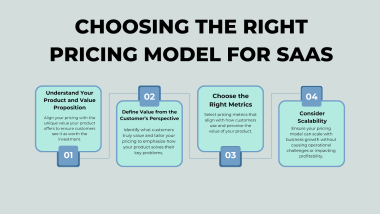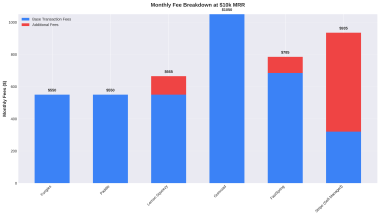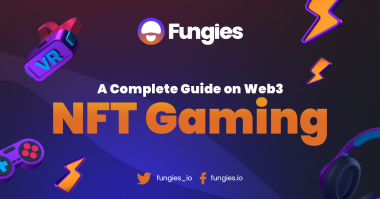Do you have an indie game that you’re ready to show the world? Here’s how to create a website so your fans and players can find out more.
Building websites used to be tough, but now it’s easier than ever! With website builders like Fungies, Wix, Squarespace and WordPress, anyone can create a website quickly and easily. Plus, there are tons of website themes available specifically designed for indie games – so you don’t have to start from scratch.
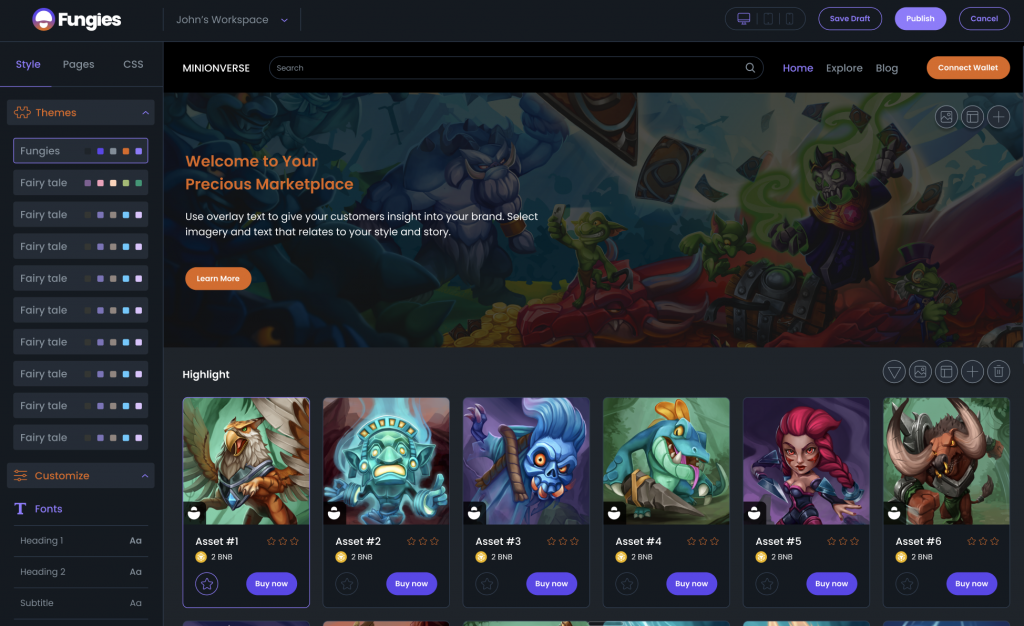
If you’re just getting started, there are even free website builders that allow you to create a professional-looking website without spending any money. But if you want some extra features or customization options, there are plenty of paid website builders as well.
No matter which website builder you choose, you can easily add your indie game’s details, screenshots and videos to show off your creation. And with the right website builder, you can even set up a store page so players can purchase and download your game.
Here are some steps you can follow to build a website for your indie game:
- Choose a platform: There are many platforms available for building websites, including WordPress, Squarespace, Wix, and Weebly. Choose the one that best suits your needs, budget, and level of expertise.
- Choose a domain name: Your domain name is the address people will use to access your website, so choose something memorable and easy to remember.
- Create your website: Once you have chosen your platform and domain name, it’s time to start building your website. Your website should be visually appealing, easy to navigate, and provide all the information potential players need to know about your game, such as screenshots, videos, and a description of the gameplay.
- Include a blog: A blog is a great way to keep your audience up to date on the development of your game. Write regular updates on your progress, share your thoughts on game design, and offer behind-the-scenes glimpses into the development process.
- Include a press kit: A press kit is a collection of assets, such as screenshots, videos, and artwork, that journalists and bloggers can use to write about your game. Include a downloadable press kit on your website to make it easy for journalists to access the assets they need.
- Include a call to action: Encourage visitors to your website to sign up for your mailing list, follow you on social media, or download a demo of your game. Include a clear call to action on your website to help build your audience.
- Optimize your website for search engines: Use keywords related to your game to optimize your website for search engines. This will help your website appear higher in search results when people search for terms related to your game.
Building a website for your indie game can take time and effort, but it can be a valuable tool for building your audience and generating interest in your project.
Free Website Builders
Using a free website builder for an indie game can be a great option for a few reasons:
Cost-effective: As an indie game developer, you may have limited resources to allocate to website development. Using a free website builder can be a cost-effective way to create a professional-looking website without having to spend money on web design or development.
Easy to use: Free website builders often come with easy-to-use templates and drag-and-drop interfaces that make it easy for non-technical users to create a website. This means that you don’t need to have any coding skills to create a website for your indie game.
Customization options: While free website builders may not have as many customization options as paid website builders or custom-built websites, they do typically offer a range of templates and customization options that can help you create a unique website that reflects the personality of your game.
Quick setup: With a free website builder, you can have a website up and running in a matter of hours or days, rather than weeks or months. This means you can start promoting your indie game and building your audience sooner.
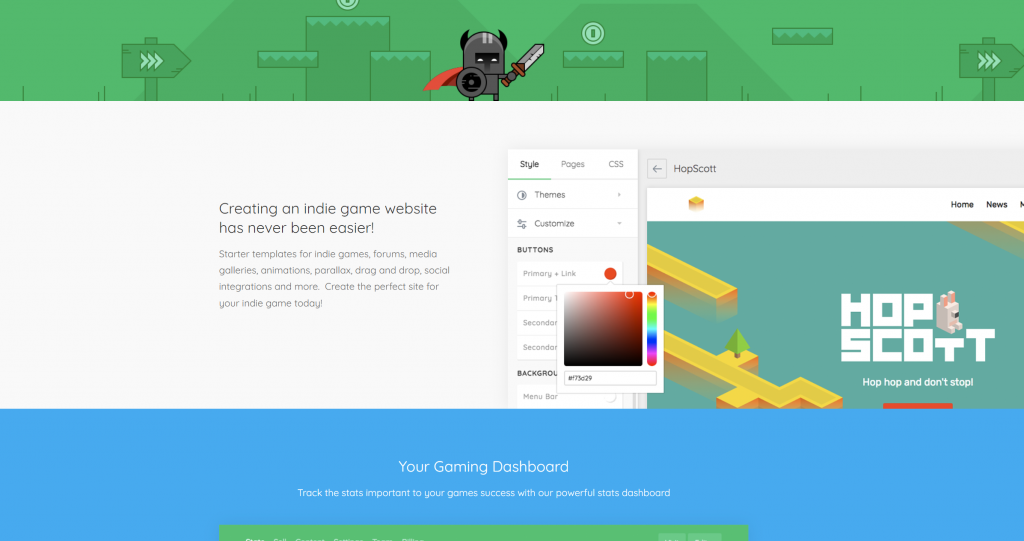
However, it’s important to note that free website builders may come with some limitations, such as a lack of advanced features or customization options, as well as restrictions on the amount of bandwidth or storage you can use. Additionally, free website builders may display ads on your website or limit your ability to monetize your site. If you have more resources available, investing in a paid website builder or custom-built website may provide more flexibility and functionality for your indie game website.
Choose domain name
There are many services available to register a domain for your indie game. Here are a few options:
- Domain registrars: Domain registrars are companies that allow you to purchase and manage domain names. Some popular domain registrars include GoDaddy, Namecheap, and Google Domains. These companies offer a range of domain extensions (.com, .net, .org, etc.) at various prices.
- Website builders: Some website builders, such as Wix, Squarespace, and Weebly, offer domain registration services as part of their platform. This can be a convenient option if you are building your website using one of these platforms.
- Web hosting companies: Many web hosting companies, such as Bluehost, HostGator, and DreamHost, offer domain registration services as part of their hosting packages. This can be a good option if you are looking for a one-stop-shop for both domain registration and website hosting.
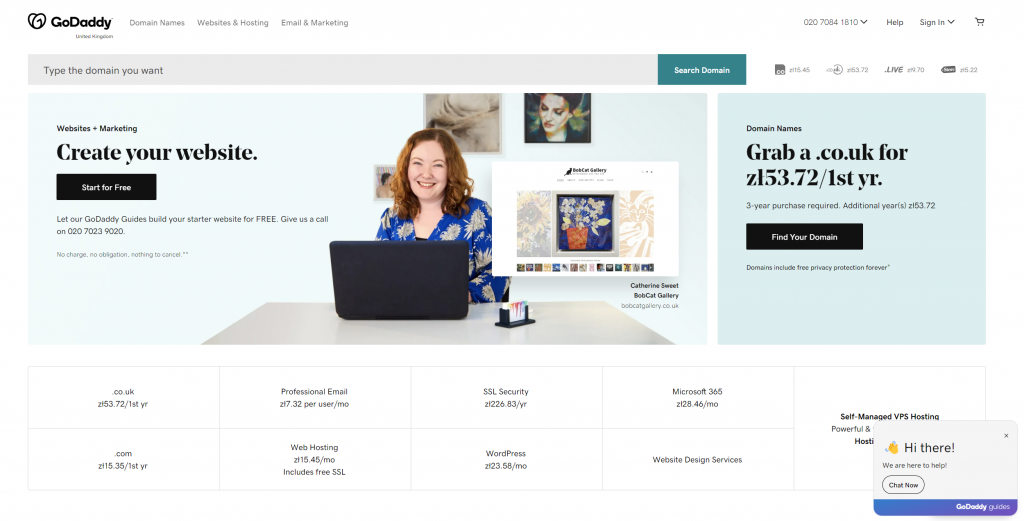
When choosing a domain registration service, it’s important to consider factors such as price, customer support, and the ease of managing your domain. Make sure to research different options and read reviews from other customers before making a decision. Additionally, it’s important to choose a domain name that is easy to remember, relevant to your indie game, and not already taken.
Important thing to remember is to register an unique name for your indie game.
Choosing a name for your indie game is an important decision that can have a significant impact on the success of your game. Your game’s name is often the first thing people will see or hear about your game, and it can play a crucial role in attracting players, generating buzz, and building a brand for your game.
One of the main reasons why choosing a good name for your indie game is important is because it can help your game stand out in a crowded market. There are thousands of games released each year, and many of them have similar titles or themes. By choosing a unique and memorable name, you can help your game stand out from the competition and make a lasting impression on potential players.
In addition to helping your game stand out, a good name can also help you attract the right audience for your game. Your game’s name should reflect the genre, theme, and style of your game, and it should appeal to the audience you are targeting. For example, if you are developing a horror game, you may want to choose a name that is dark, ominous, and unsettling to attract fans of the horror genre.
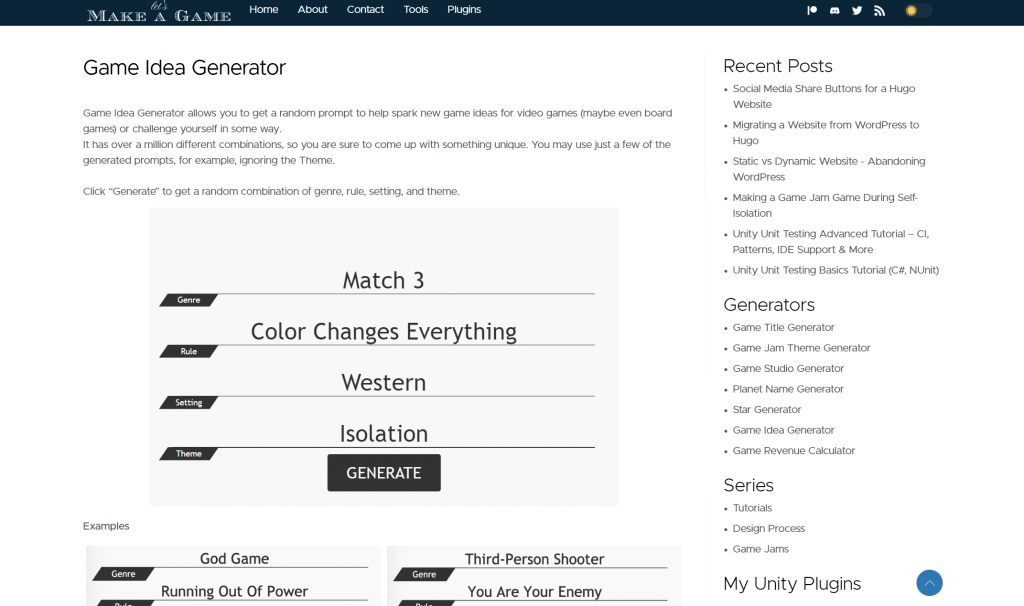
Another reason why choosing a good name for your indie game is important is because it can help you build a brand for your game. Your game’s name is often the foundation of your brand, and it can help you create a distinct identity for your game that sets it apart from other games in the market. By choosing a name that is memorable, catchy, and easy to remember, you can help players associate your game with a specific style or genre, and build a loyal fanbase for your game.
In addition to building a brand, a good name can also help you generate buzz and hype for your game. When people hear about your game’s name, they may be curious to learn more about it and share it with their friends and followers on social media. By choosing a name that is intriguing, exciting, or mysterious, you can create a sense of anticipation and excitement around your game’s release, and generate interest in your project.
Finally, choosing a good name for your indie game is important because it can impact your game’s discoverability and search engine optimization (SEO). When people search for games online, they often use keywords related to the genre, theme, or style of the game. By including these keywords in your game’s name, you can increase the likelihood that your game will appear in search results and make it easier for potential players to find your game.
In conclusion, choosing a good name for your indie game is an important decision that can have a significant impact on the success of your game. By choosing a unique and memorable name that reflects the genre, theme, and style of your game, you can help your game stand out from the competition, attract the right audience, build a brand for your game, generate buzz and hype, and improve your game’s discoverability and SEO.
Unity SDK integration with ingame store
Having your own website and storefront for your indie game is incredibly important for a number of reasons, and integrating it with your game through a Unity SDK can take your game to the next level.
One of the main benefits of having your own website and storefront is that it gives you complete control over how your game is marketed and sold. When you rely solely on third-party marketplaces like Steam or the App Store, you are limited by their rules, restrictions, and fees. By having your own website and storefront, you can set your own prices, create your own promotional materials, and sell your game without having to pay a middleman.
In addition to giving you more control, having your own website and storefront can also help you build a brand for your game. When you have your own website, you can create a unique design and aesthetic that reflects the personality of your game, and you can use it to promote your game across different channels, such as social media, email marketing, and content marketing. This can help you create a cohesive brand that sets your game apart from the competition and attracts the right audience.
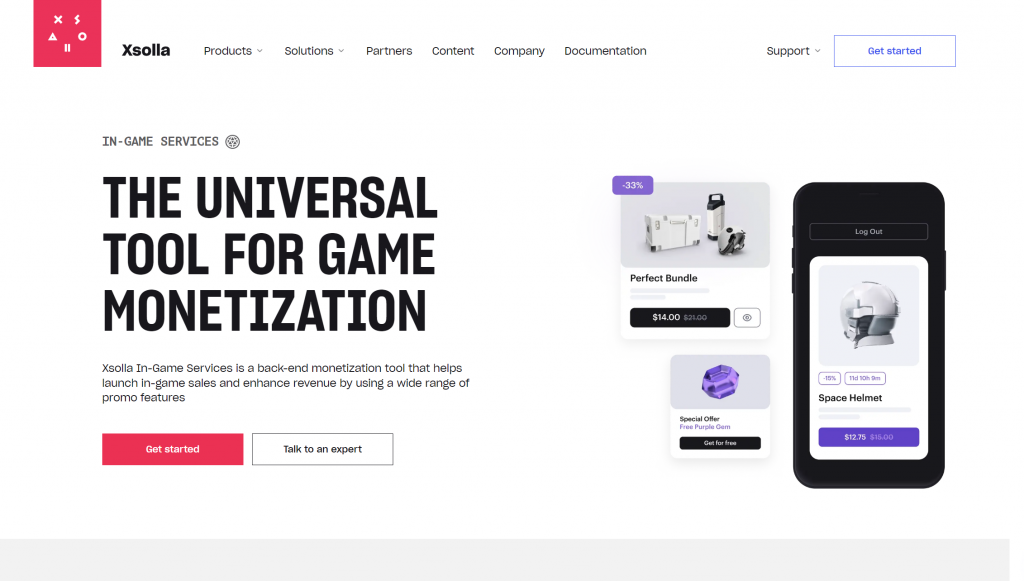
By integrating your website and storefront with your game through a Unity SDK, you can also create a seamless user experience that makes it easy for players to buy and play your game. When players download your game, they can be taken directly to your website to purchase the full version, buy in-game items, or access exclusive content. This can help you increase your revenue and engagement, and build a loyal fanbase for your game.
Another benefit of having your own website and storefront is that it allows you to gather valuable data and insights about your players. When players purchase your game through your website, you can collect data such as their email address, location, and purchase history, which you can use to personalize your marketing and improve your game. This can help you create a more targeted and effective marketing strategy, and improve the overall user experience for your players.
By integrating your website and storefront with your game through a Unity SDK, you can also create a more engaging and immersive gameplay experience for your players. For example, you can use the SDK to create in-game pop-ups or menus that allow players to purchase items or access content without leaving the game. You can also use the SDK to create personalized offers or discounts for players who have already purchased your game, which can help you build loyalty and retention.
Finally, having your own website and storefront with an integrated Unity SDK can help you future-proof your game and your business. By having your own platform, you can adapt to changes in the market, experiment with new features and pricing strategies, and explore new revenue streams, such as merchandising or subscriptions. This can help you create a sustainable and profitable business model that supports your game development and growth.
In conclusion, having your own website and storefront for your indie game is essential for creating a successful and sustainable business. By integrating it with your game through a Unity SDK, you can create a seamless user experience, build a brand for your game, gather valuable data and insights, create a more engaging gameplay experience, and future-proof your business. If you are an indie game developer, it’s important to invest in your own website and storefront, and explore the many benefits that it can offer your game and your business.
Payment integration
There are a variety of payment integrations and payment methods available for indie game websites and in-game stores. Here are some of the most popular options:
Payment Integrations:
- Stripe: Stripe is a popular payment processing platform that offers a range of features and integrations. It is easy to set up and offers a streamlined checkout experience for customers. Stripe supports a variety of payment methods, including credit cards, debit cards, and mobile payments.
- PayPal: PayPal is a well-known payment processor that allows users to make payments with their PayPal balance, bank account, or credit card. It is widely accepted and offers a range of features and integrations.
- Braintree: Braintree is a payment gateway that offers a range of features and integrations, including support for recurring payments and mobile payments. It is a popular choice for subscription-based businesses.
- Square: Square is a payment processing platform that offers a variety of tools for small businesses, including a POS system, online payments, and mobile payments. It is easy to set up and offers transparent pricing.
- Authorize.net: Authorize.net is a payment gateway that offers a range of features and integrations, including support for recurring payments and mobile payments. It is a popular choice for businesses that need to process large volumes of transactions.
Payment Methods:
- Credit cards: Credit cards are a popular payment method for online purchases, and most payment processors support major credit cards such as Visa, Mastercard, and American Express.
- Debit cards: Debit cards are another popular payment method, and are often used for smaller purchases or by customers who do not have a credit card.
- Mobile payments: Mobile payments are becoming increasingly popular, and many payment processors support mobile payment methods such as Apple Pay and Google Pay.
- Cryptocurrency: Some payment processors also support payment methods such as Bitcoin and other cryptocurrencies, which can be a convenient option for customers who prefer to use these payment methods.
If you’re looking for a solution to sell your ingame items or CD Keys with Cryptocurrencies, you can choose Fungies no-code store solution to sell anything virtual with payments in cryptocurrencies. When choosing a payment integration and payment method for your indie game website or in-game store, it’s important to consider factors such as security, ease of use, and fees. Make sure to research different options and read reviews from other customers before making a decision. Additionally, it’s important to offer a variety of payment options to customers to ensure that they can easily make purchases and support your indie game.
Summary
In today’s digital age, having a strong online presence is crucial for success in any industry, including the gaming industry. For indie game developers, having a website can be an effective way to build a brand and reach a wider audience. A website allows developers to showcase their games and provide information to potential players, investors, and partners.
Having a website provides an indie game developer with control over their online presence. Unlike social media platforms or third-party marketplaces, a website allows developers to create a unique brand identity that reflects their vision and values. With a website, developers can customize the design, layout, and content to suit their needs and preferences.
A website also allows developers to connect with their audience on a deeper level. Through blog posts, developer diaries, and behind-the-scenes content, developers can engage with their fans and build a community around their games. This kind of engagement can help to create loyal fans who are more likely to share the game with their friends and family.
Additionally, a website can serve as a central hub for all the important information related to the game. This includes features, screenshots, trailers, release dates, and FAQs. A well-organized website can help to ensure that potential players have all the information they need to make an informed decision about purchasing the game.
Finally, having a website can also help indie game developers with marketing and distribution. By creating a professional-looking website and engaging with potential players through social media and other online channels, developers can generate buzz and build anticipation for their game. They can also use their website to sell the game directly to players, or to link to third-party marketplaces where the game is available for purchase.
In conclusion, having a website is a crucial tool for indie game developers to promote their games, connect with their audience, and build a strong brand identity. With a website, developers can take control of their online presence and showcase their games in the best possible light.
